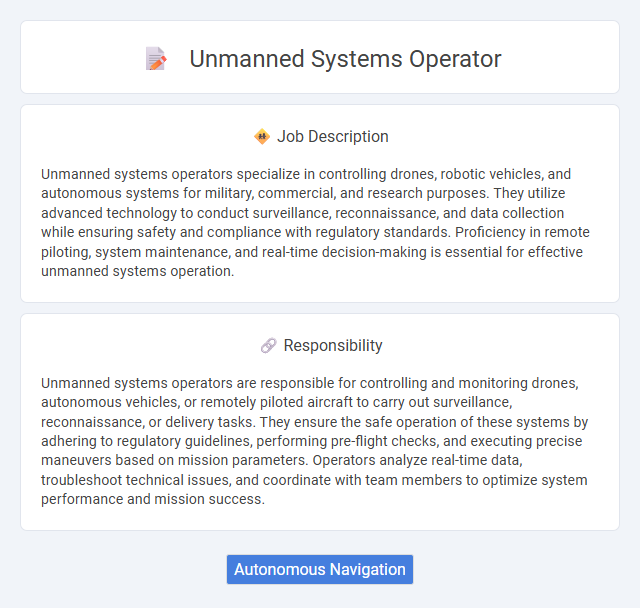
Unmanned systems operators specialize in controlling drones, robotic vehicles, and autonomous systems for military, commercial, and research purposes. They utilize advanced technology to conduct surveillance, reconnaissance, and data collection while ensuring safety and compliance with regulatory standards. Proficiency in remote piloting, system maintenance, and real-time decision-making is essential for effective unmanned systems operation.
Individuals with strong technical skills and a high level of concentration are likely suitable for an unmanned systems operator role. Those who can remain calm under pressure and adapt quickly to changing situations may find this job aligns well with their capabilities. However, people prone to stress or difficulty with multitasking might face challenges in this position.
Qualification
Unmanned systems operators require specialized training in remote control technologies, aerodynamics, and systems navigation to effectively manage drones, UAVs, or robotic vehicles. Proficiency in real-time data analysis, cybersecurity protocols, and compliance with aviation or military regulations is essential for mission success and safety. Certification from recognized bodies such as the FAA Part 107 for drone operation or equivalent defense training programs significantly enhances qualification credentials.
Responsibility
Unmanned systems operators are responsible for controlling and monitoring drones, autonomous vehicles, or remotely piloted aircraft to carry out surveillance, reconnaissance, or delivery tasks. They ensure the safe operation of these systems by adhering to regulatory guidelines, performing pre-flight checks, and executing precise maneuvers based on mission parameters. Operators analyze real-time data, troubleshoot technical issues, and coordinate with team members to optimize system performance and mission success.
Benefit
Unmanned systems operators likely experience enhanced operational efficiency by controlling drones or robotic vehicles remotely, reducing the need for human presence in hazardous environments. The role probably offers competitive salaries and opportunities for technical skill development in cutting-edge technology fields. Job stability and growth potential might be significant due to increasing reliance on unmanned systems across various industries.
Challenge
Unmanned systems operator roles likely demand high levels of technical skill and adaptability due to the complexity of controlling autonomous vehicles and drones. The challenge may stem from navigating dynamic environments, ensuring precise operation while responding quickly to unexpected issues. Operators probably face ongoing pressure to maintain situational awareness and troubleshoot sophisticated systems under time-sensitive conditions.
Career Advancement
Unmanned systems operators have strong career advancement opportunities driven by expertise in drone technology, data analysis, and remote vehicle management. Gaining certifications in specialized UAV operations and cybersecurity enhances prospects for leadership roles in defense, agriculture, and surveying industries. Continuous skill development in AI integration and systems maintenance positions operators for advanced roles in project management and systems engineering.
Key Terms
Autonomous Navigation
Unmanned systems operators specializing in autonomous navigation manage and control drones or robotic vehicles that use advanced sensors and AI algorithms for self-directed movement. They ensure precise route planning, obstacle detection, and real-time decision-making to optimize mission efficiency and safety in applications such as surveillance, agriculture, and defense. Mastery of GPS technology, LiDAR mapping, and machine learning is essential for successful operation and troubleshooting of autonomous navigation systems.
 kuljobs.com
kuljobs.com